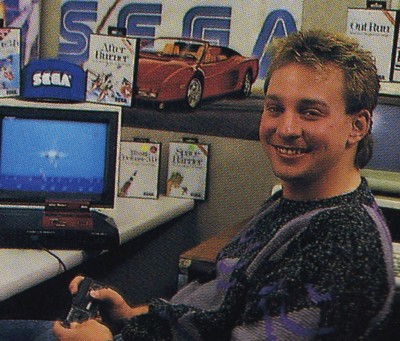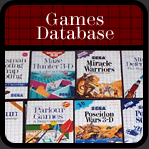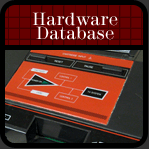 |
||
|---|---|---|
| Check out that sweet sign in the background. |
Where are you from and do you have any memories from your youth concerning video games?
I grew up in Chicago and remember my first LCD Pong game. When the SMS was launched, I was a big Ultima fan and played on an old MAC with a green screen. I did a lot of floppy swapping back then!
Where did you go to college and did you study anything in reference to video games? If not, what did you study?
I went to the University of Minnesota (very close to the old Tonka Toys HQ). I was an English major and started at Tonka as a copywriter.
How did you first get connected with Sega?
My first encounter with Sega was playing an SMS in the Tonka lunchroom. I was the only person in the company who knew anything about video games, so they put me on the Sega Marketing Team and launched me on the best career path of my life!
What got you your first job with Sega? What did you do (I know you kind of mentioned this before, but give me as much as you want so I have it in one email)?
I started by writing packaging and catalog copy, but Ray McDonald and Partrick Feely (vice president and president) liked me and began training me in marketing. I ended up managing localization and product development, working with Japanese development teams to streamline games for US play tastes so that the game would be challenging but not too difficult for US audiences (Japanese gamers wanted their games a whole lot harder and this difference in play level gave rise to the popularity of hint books, of which there are so many today). I worked on most of the games Sega produced and many third parties produced in the U.S. Some worth mentioning are After Burner, Phantasy Star, Alf, Shinobi, the Wonder Boy series, Monopoly and Walter Payton Football. I did localization for most games (translating from Japanese to English), wrote the packaging text, managed graphic design, wrote game story lines and even produced a few games.
Did you take any part in advertising?
Yes. In addition to being the editor of the Sega Challenge Newsletter, I spent quite a bit of time at advertising agencies in LA and New York playing games so the footage could be used in commercials. I was also involved in writing advertising.
In case anyone is interested, his footage was also used for two Sega Preview VHS tapes that show a series of games being played to advertise them. Originally, these tapes were sold via the Sega Challenge Newsletter, but it's doubtful any will ever pop up. If there are any left, the numbers are probably so scant it isn't even funny. It's likely people who worked with Sega have some, but don't ask them for them!
Did you help with programming?
I was not a coder but I did a lot of play testing and bug hunting.
Which games were you particularly fond of working on? Which were you disappointed with and why?
I was a huge RPG fan and love those the most. Phantasy Star is still my all-time favorite game. I produced it (but got no credit!) and developed the US storyline. The single most disapointing game I worked on was Aztec Adventure, a game with very poor play that Sega Japan insisted be launched in the US.
Since I know you helped with Alf, I need to ask this. Most SMS fans consider Alf to be a poor title overall. Since you had first hand experience in the creation of this game, could you shed some light on its history? Was it a port of the IBM version? Were you faced with time constraints?
Alf was a title that was completely developed for the SMS by a US development team with no console experience. They asked me to 'save' the title. The poor quality of the game was light years better than the code that had been developed for release! I camped out in the development office for a few weeks, revising levels, found musicians to get the sound finished and in general got stuff done with next to no budget. I did not think the game should be released by I had my orders LOL.
What do you consider to be your greatest achievement while working with Sega?
My single greatest achievement would be Phantasy Star, but really it was working with all the Sega titles and providing a brand strength and fan base which made the launch of the Genesis possible.
How did you feel about Tonka's attempt at marketing the SMS in the United States, which many people incorrectly consider to be one of the key factors in its downfall there?
Tonka provided awesome marketing support and locked the SMS in the market as one of the dominant systems, so I cannot see it as a downfall. The system saw about three years sales total, and transitioned out as Sega launched the Genesis. Video game systems tend to cycle out every 3 to 5 years, so its end of life was a natural occurence. Prior to Tonka's involvement, the SMS was on a deep slide. Tonka made the system successful.
Did Sega of America have any major problems with Nintendo? How did the company cope with the literal monopoly held by the NES in the states?
Sega coped with Nintendo by finding a market saavy partner, Tonka. The relationship between Sega and Nintendo was very adversial.
Did you have any contact with Nintendo at any point during the Master System's run in the US? What about?
I did. I knew most of the Nintendo people and we socialized during trade events. At the marketing and development level relationships were competitive but friendly.
Whenever the SMS was beginning to lose its fanbase in the US, how did you feel? How long did you work for Sega after they ended their system on the NTSC market and moved on to the Genesis?
I was sad to see the SMS reach its end of life and did work on some titles and systems variations that were supposed to extend the lifecycle. Most did not see market release as Sega wanted to focus on switching users to the Genesis. Remember the Master System Converter? That was one of them.
Did you ever get to work with the proposed Graphics Board or Disk Drive that were slated for release? I would assume they fit in this category. I believe the board was tested here based on a prototype or model from Japan. Know anything about this?
I remember seeing the disk drive. The SMS was approaching the end of its life and the investment required to launch a product like the disk drive would not have made enough return to warrant the efforts, so it was passed upon.
Next Page >>





